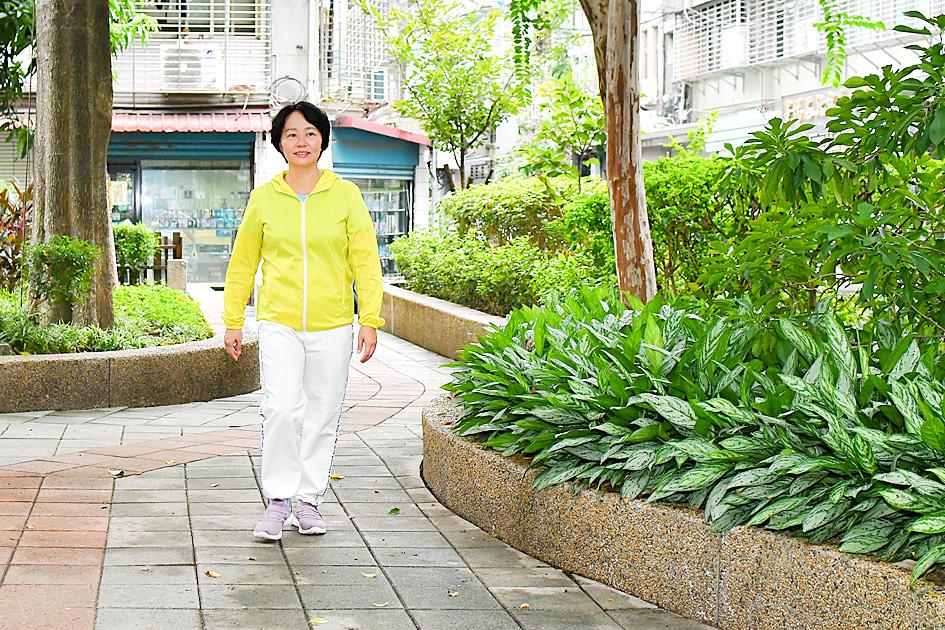The Taiwanese Osteoporosis Association yesterday urged people to start doing strength training regularly and maintain sufficient protein intake before the age of 50 to prevent loss of mobility due to aging.
Association chairman Wing Chan (陳榮邦), director of Taipei Municipal Wanfang Hospital’s Department of Radiology, said that Taiwan’s demographic structure is changing drastically and is expected to become a super-aged society by 2025.
The elderly population was only about 1.49 million (7.1 percent of the total population) in 1993, but it is expected to reach more than 4.7 million (20.1 percent of the total population) by 2025, so maintaining mobility for elderly people would become an important issue, he said.

Photo courtesy of the Taiwanese Osteoporosis Association
“About one in three people in Taiwan have hidden risks of experiencing mobility problems,” Chan said, adding that an estimated 2.86 million people have low bone density (osteoporosis), an estimated 810,000 people have low muscle mass (sarcopenia) and an estimated 3.53 million people have joint disorders or degenerative joint disease.
Bone density, joint motion and muscle mass have an interactive relationship, and middle-aged people should start taking physical mobility seriously to maintain a better life quality when they reach old age, he said.
“Standing up very slowly or needing support when standing up from a sitting position might be early warning signs of mobility loss,” Chan said, adding that the clinical evaluation of mobility include a dual energy X-ray absorptiometry, a timed walk test, a handheld dynamometer reading, and a gait and balance assessment.
Three common problems that might lead to mobility loss are “only using pain relief patches, waist belts or knee protective gear” for muscle pain or weakness; “insufficient protein and calcium intake,” as many middle-aged or elderly people believe they should eat less meat; and “believing that taking a stroll, walking a dog or riding a bicycle” is enough exercise, but they are ineffective, he said.
Chan said the majority of elderly people in Taiwan have insufficient intake of dairy products, and while many people might drink soy milk for protein, milk contains more calcium and protein, as well as whey protein, which is an important source of essential amino acids to support muscle mass.
Huang Chun-feng (黃駿豐), director of National Yang-Ming University Hospital’s Department of Family Medicine, said the best way to prevent loss of mobility is to “improve protein intake” and to both do “cardio exercises and resistance training” regularly.
He suggested doing strength training two to three sessions per week to increase muscles strength and endurance, with each session lasting one-and-a-half hours.
The exercises can be daily activities such as lifting heavy grocery bags while climbing a flight of stairs, lifting water bottles or doing squats at home, or using exercise equipment in parks.
Drinking two cups of milk per day, especially during breakfast or after exercise, is also recommended for ensuring sufficient protein intake, he added.

An essay competition jointly organized by a local writing society and a publisher affiliated with the Chinese Communist Party (CCP) might have contravened the Act Governing Relations Between the People of the Taiwan Area and the Mainland Area (臺灣地區與大陸地區人民關係條例), the Mainland Affairs Council (MAC) said on Thursday. “In this case, the partner organization is clearly an agency under the CCP’s Fujian Provincial Committee,” MAC Deputy Minister and spokesperson Liang Wen-chieh (梁文傑) said at a news briefing in Taipei. “It also involves bringing Taiwanese students to China with all-expenses-paid arrangements to attend award ceremonies and camps,” Liang said. Those two “characteristics” are typically sufficient

A magnitude 5.9 earthquake that struck about 33km off the coast of Hualien City was the "main shock" in a series of quakes in the area, with aftershocks expected over the next three days, the Central Weather Administration (CWA) said yesterday. Prior to the magnitude 5.9 quake shaking most of Taiwan at 6:53pm yesterday, six other earthquakes stronger than a magnitude of 4, starting with a magnitude 5.5 quake at 6:09pm, occurred in the area. CWA Seismological Center Director Wu Chien-fu (吳健富) confirmed that the quakes were all part of the same series and that the magnitude 5.5 temblor was

The brilliant blue waters, thick foliage and bucolic atmosphere on this seemingly idyllic archipelago deep in the Pacific Ocean belie the key role it now plays in a titanic geopolitical struggle. Palau is again on the front line as China, and the US and its allies prepare their forces in an intensifying contest for control over the Asia-Pacific region. The democratic nation of just 17,000 people hosts US-controlled airstrips and soon-to-be-completed radar installations that the US military describes as “critical” to monitoring vast swathes of water and airspace. It is also a key piece of the second island chain, a string of

The Central Weather Administration has issued a heat alert for southeastern Taiwan, warning of temperatures as high as 36°C today, while alerting some coastal areas of strong winds later in the day. Kaohsiung’s Neimen District (內門) and Pingtung County’s Neipu Township (內埔) are under an orange heat alert, which warns of temperatures as high as 36°C for three consecutive days, the CWA said, citing southwest winds. The heat would also extend to Tainan’s Nansi (楠西) and Yujing (玉井) districts, as well as Pingtung’s Gaoshu (高樹), Yanpu (鹽埔) and Majia (瑪家) townships, it said, forecasting highs of up to 36°C in those areas